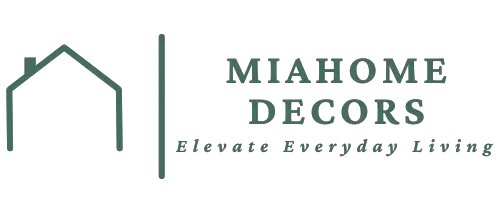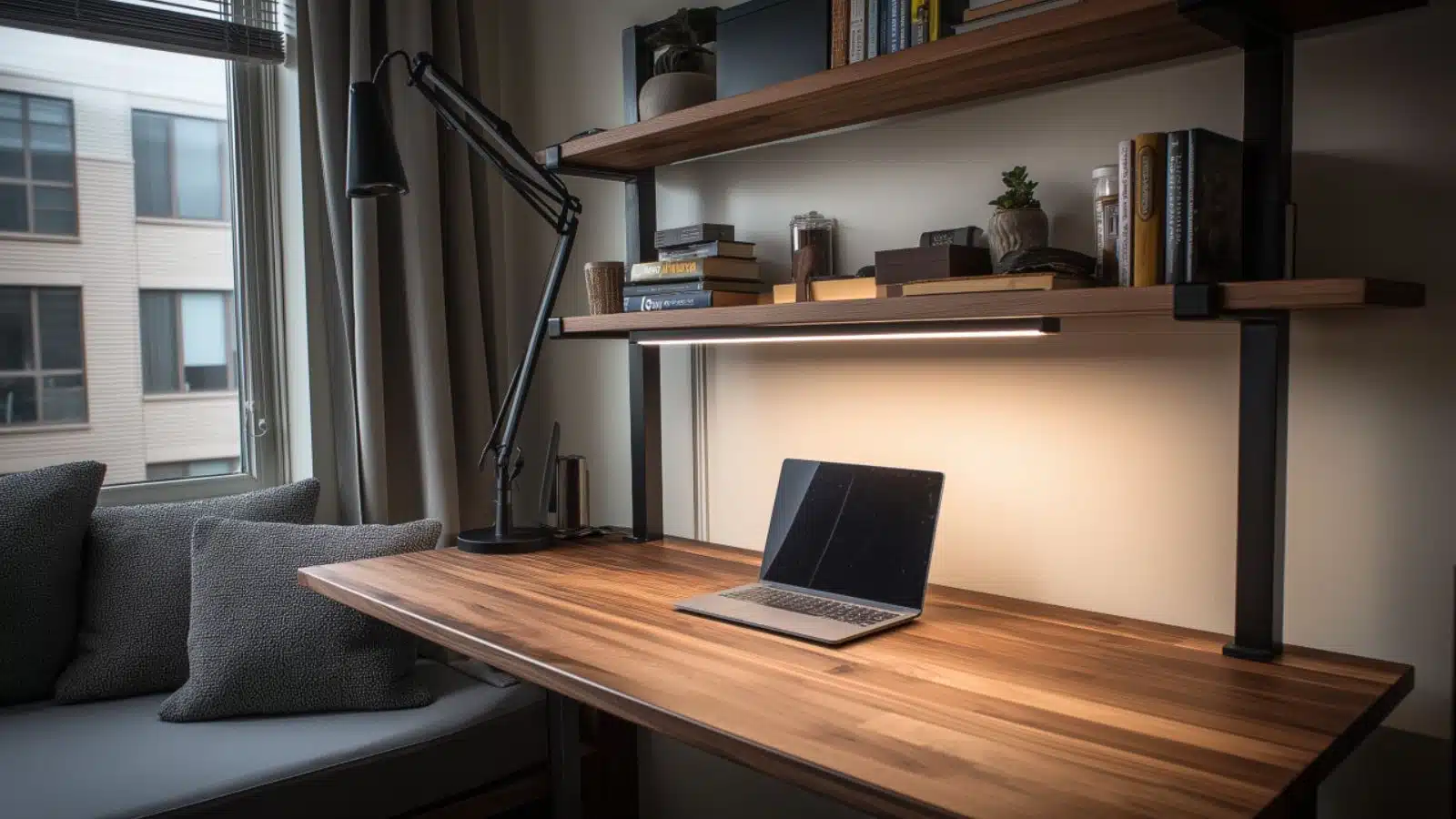Design a Productive Boys Dorm Room with Study and Desk Zones for Maximum Focus and Comfort
Table of Contents
College dorm rooms are notoriously small, often shared, and usually come with the bare minimum in furnishings. Yet, they’re expected to be so much more—a bedroom, a study zone, a dining nook, and even a hangout spot. For boys in particular, who may prioritize function over style, creating a space that fosters focus and comfort is key. A productive dorm room isn’t just a luxury—it’s a game-changer.
According to a study by the National Sleep Foundation and the American College Health Association, students who feel their room supports studying report higher academic performance and lower stress levels. And while not every dorm offers sprawling square footage, smart design choices can make even the smallest space feel functional and motivating.
In this article, we’ll explore how to design a boys dorm room with dedicated study and desk zones that actually encourage productivity. From choosing the right furniture to maximizing vertical storage and minimizing distractions, we’ll cover everything you need to create a space that works hard—so your student can, too. Whether you’re a parent preparing your son for freshman year or a student looking to upgrade your current setup, this guide will offer inspiring, practical ideas grounded in thoughtful home decor principles.
Choosing the Right Desk Setup for Focus and Function
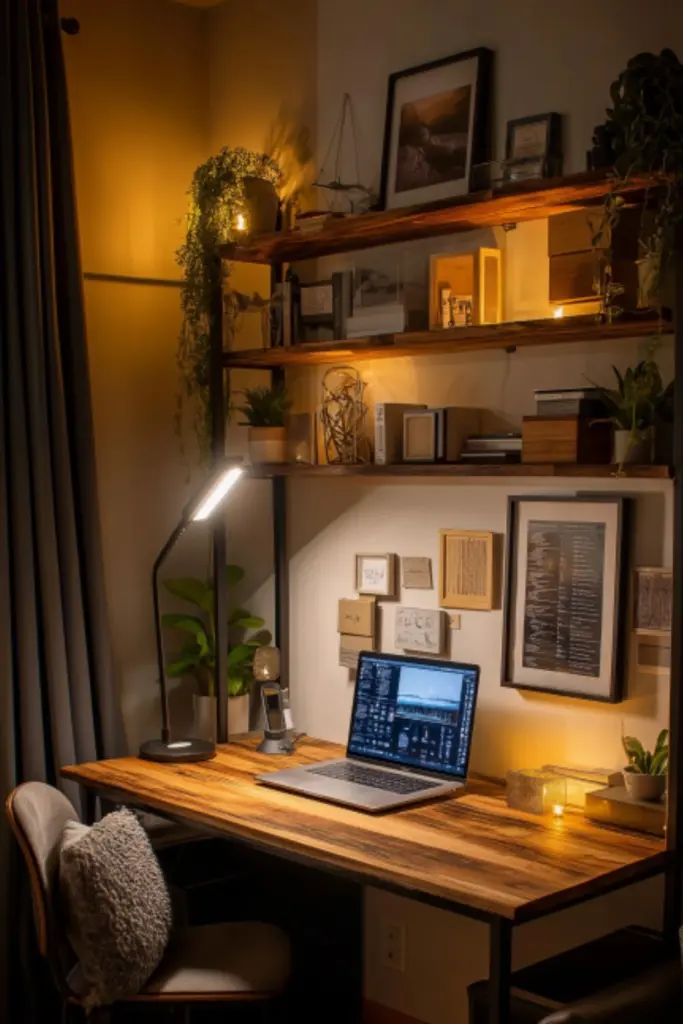
The desk is the anchor of any productive dorm room. It’s not just where studying happens—it’s where deadlines are met, ideas are born, and sometimes, meals are eaten. Selecting the right desk setup is essential for optimizing comfort, focus, and efficiency.
Start by evaluating the space. Many dorms include a basic desk, but if it lacks storage or feels too cramped, consider supplementing it with under-desk drawers or a raised monitor shelf. If the dorm allows, replacing it with a compact standing desk or a foldable wall-mounted option can save space while offering ergonomic benefits.
The placement of the desk also matters. Ideally, position it near a natural light source—like a window—but away from high-traffic or noisy areas of the room. Lighting is another key factor: a flexible LED task lamp with color temperature control can dramatically reduce eye strain during long study sessions.
| Desk Setup Element | Purpose | Ideal Feature |
|---|---|---|
| Desk surface | Workspace for laptop, books, writing | Minimum 40” wide, scratch-resistant |
| Task lighting | Improves focus and reduces eye fatigue | Adjustable brightness, daylight spectrum |
| Ergonomic chair | Encourages posture and comfort | Lumbar support, adjustable height |
| Desk storage | Keeps clutter at bay | Drawer units, desktop organizers, cable trays |
Smart Storage Solutions to Keep the Desk Zone Clutter-Free
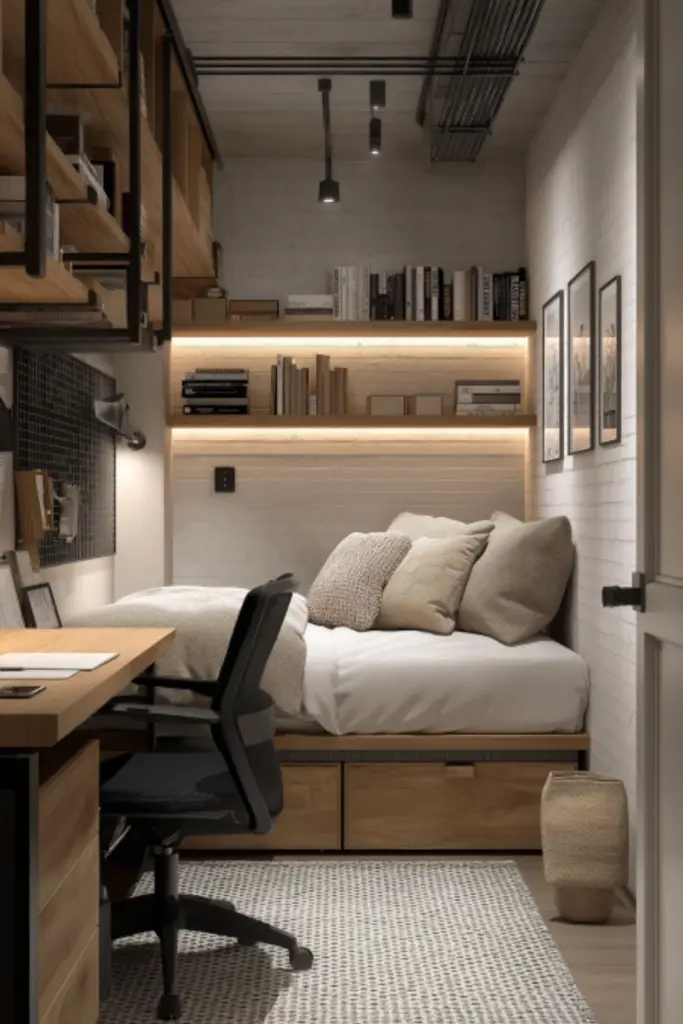
Clutter is the enemy of concentration. In a small dorm room, it’s easy for books, chargers, snacks, and stationery to pile up—especially when shared with a roommate. That’s why having smart storage around your study zone is crucial for maintaining a sense of order and control.
Start with vertical storage. Wall-mounted cubbies, pegboards, or wire grids above the desk can hold headphones, cords, or small supplies within reach. Consider adding stackable drawer units beneath the desk for items that don’t need to be visible but should be accessible.
Use drawer organizers or desktop trays to segment pens, flash drives, sticky notes, and other small tools. Incorporate storage bins with lids for lesser-used items, and if space allows, a rolling cart can function as mobile storage that tucks away neatly.
| Storage Solution | Use Case | Style Tip |
|---|---|---|
| Pegboard or grid panel | Hang headphones, notes, chargers | Add color-coded clips or baskets |
| Under-desk drawers | Store paper, notebooks, cables | Choose clear drawers to see contents easily |
| Desktop organizers | Hold pens, scissors, flash drives | Stick to neutral tones for a calm look |
| Rolling utility cart | Portable storage for snacks, books | Add a plant or speaker on top for layering |
Creating Study Zones Without Sacrificing Relaxation Space
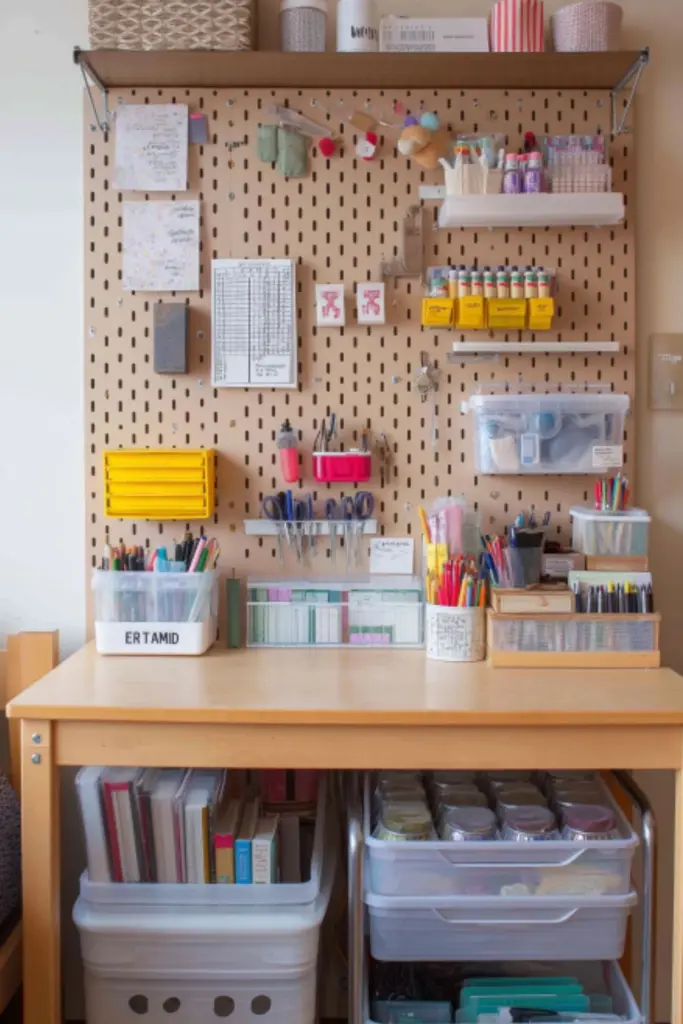
A dorm room isn’t all about work—it also needs to feel like a refuge. The challenge is striking a balance between a focused study zone and a relaxing personal retreat, especially when working with a limited layout.
The key lies in zoning. Use subtle visual dividers to separate your work area from rest space. A small area rug beneath the desk can define the study zone. Bookshelves or open cubbies can act as soft barriers between a bed and desk without closing off the room.
Consider lighting control as part of your zoning strategy. Use bright, focused task lighting at the desk and warmer ambient lighting for the bed or lounge area. This contrast helps train the brain to distinguish between study and rest areas.
| Zoning Method | Purpose | How to Implement |
|---|---|---|
| Rug under desk | Defines workspace boundaries | Choose low-pile, easy-clean material |
| Shelf divider | Separates desk from sleep zone | Use open-back shelf to maintain light flow |
| Dual lighting styles | Signals different uses of space | Use task light for desk, soft lamp for bed |
| Decor variation | Sets mood for different zones | Use bold colors in desk zone, neutrals in bed |
Maximizing Wall Space with Vertical Organizers and Functional Decor
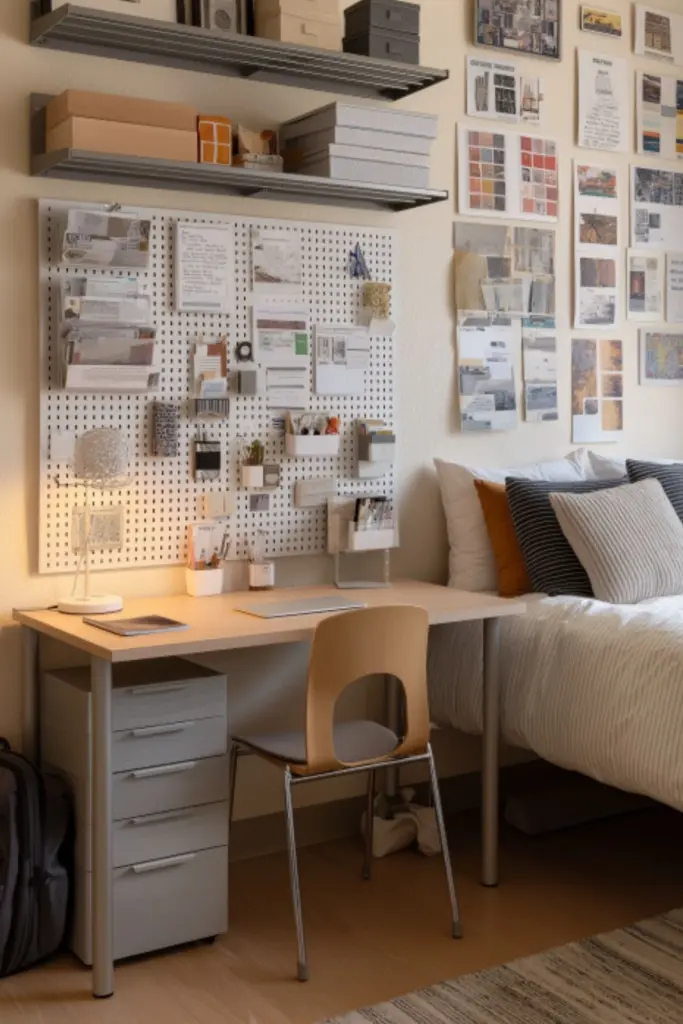
In a tight dorm room, walls are more than just places to hang posters—they’re untapped real estate for vertical storage and multi-functional decor. Utilizing wall space efficiently can help keep the floor clear and the mind uncluttered.
Start with floating shelves above the desk for textbooks, reference materials, or framed inspiration. Install a slim corkboard or whiteboard for quick notes, deadlines, or vision boards. Magnetic boards or hanging file folders can also be helpful for sorting mail and assignments.
For boys who value aesthetics, opt for functional wall decor like framed sports memorabilia, modern clocks, or minimalist art that doubles as motivation. These pieces add personality without sacrificing utility.
| Wall Feature | Function | Design Benefit |
|---|---|---|
| Floating shelves | Book or display storage | Adds vertical interest and clears desk |
| Corkboard or whiteboard | Note-taking and reminders | Keeps to-dos visible without clutter |
| Hanging folders | Sorts papers and files | Frees up drawer space |
| Functional art | Personalizes space | Boosts mood and creates an inspiring look |
Lighting Choices That Enhance Productivity and Ambience
Lighting plays a powerful yet often underestimated role in dorm room design. The right lighting not only supports eye health but can also drastically improve productivity, reduce fatigue, and create a space that feels welcoming and calm.
Start with the essentials: a good task light at the desk. Look for an LED lamp with an adjustable arm and brightness levels. Some even come with color temperature control to switch from bright white (ideal for reading) to warmer tones for relaxed evenings.
Beyond the desk, consider adding ambient lighting with string lights, floor lamps, or under-bed LED strips. These offer a softer, more relaxed glow that helps distinguish the downtime zone from the study zone.
Natural light is also critical. If possible, keep the desk near a window, using sheer curtains to diffuse harsh sunlight. Avoid heavy drapes that block daytime light—natural brightness helps regulate sleep and improves alertness during the day.
Lighting breakdown:
| Lighting Type | Best Use | Tips for Placement |
|---|---|---|
| Desk/task lamp | Studying, reading, typing | Place on opposite side of dominant hand |
| Ambient lamp or string lights | Relaxation, winding down | Use warm-toned bulbs |
| LED strip lighting | Under shelves or bed | Use remote control for easy access |
| Natural window light | General productivity and wellness | Avoid glare by angling desk away slightly |
Compact Multi-Functional Furniture for Tight Dorm Layouts
Dorm rooms don’t offer much space, so every piece of furniture needs to serve more than one purpose. Multi-functional furniture helps create a dorm that is not only productive but also flexible and livable.
A lofted bed can create valuable space underneath for a desk, reading nook, or dresser. Many dorms allow (or even provide) lofting kits, and elevating the bed gives you instant square footage below. Alternatively, opt for a bed riser to store bins or drawers underneath.
Look for a storage ottoman that doubles as seating and a place to hide snacks or books. A fold-out desk can be mounted on the wall and closed when not in use, perfect for small floorplans. Desk chairs with built-in storage pockets are also handy for books and accessories.
| Furniture Item | Primary Use | Bonus Feature |
|---|---|---|
| Lofted bed | Sleeping area | Frees up space for study or storage below |
| Storage ottoman | Footrest or seat | Concealed storage inside |
| Fold-down wall desk | Workspace | Folds up to save space |
| Rolling storage caddy | Mobile organizer | Doubles as nightstand or printer stand |
Conclusion
Designing a productive boys dorm room doesn’t require expensive overhauls or extensive square footage. With a focus on intentional zones, vertical storage, and multi-purpose furniture, even the smallest dorm can become a well-balanced space for both focus and rest.
The key is to blend function with comfort—choosing pieces and layouts that support academic success while still feeling like home. From a well-lit desk setup to personalized organization and relaxing lighting, each design choice plays a role in shaping a productive college experience.
In the end, a thoughtfully designed dorm room isn’t just about aesthetics—it’s a powerful tool that helps students stay grounded, inspired, and ready to tackle whatever comes their way.
